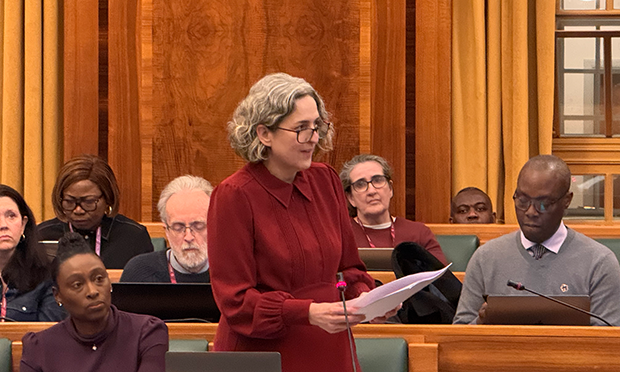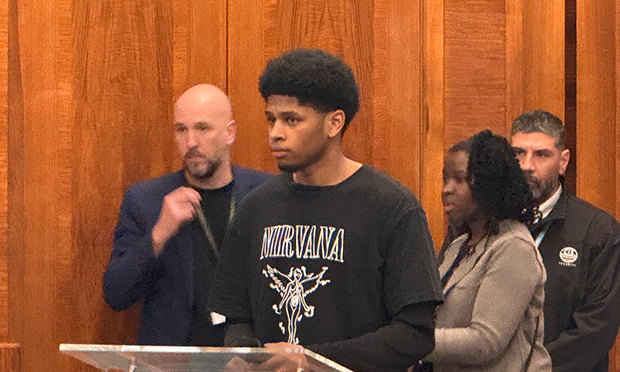Hackney’s deficit has shrunk by £16m, says mayor

Mayor of Hackney Caroline Woodley at last night’s meeting. Photograph: Josef Steen / free for use by LDRS partners
Hackney’s mayor has said the council has reduced its £67m budget gap with help from central government, amid accusations of hypocrisy over continued cuts to services.
At the Town Hall’s annual budget meeting last night (26 February), Mayor Caroline Woodley revealed that the figure touted in November has now fallen by over 20 per cent after a “careful use of reserves” and a cash injection from last year’s local government finance settlement.
Her announcement came in response to a question from 18-year-old resident Dylan Law, who had asked why the council was introducing “£67m in austerity” over the next three years – arguing that this goes “directly against what was promised”.
Placing the blame squarely on the previous government, the mayor said it was impossible to turn around overnight the “harm inflicted on Hackney” by £150m in lost funding since 2010.
“We do not want to live under austerity. We want to focus on growth,” she said, but Laws asked her if she felt it was “hypocritical” to plan for cutbacks up to 2028 after heavily criticising the Conservatives for the same thing.
“I don’t feel hypocritical at all because I’m focusing on ambition and I’m focusing on growth,” the mayor said.
“We want to work with our residents to do better and we will not continue under austerity.”
The council has previously denied that it or the national Labour government is continuing austerity, highlighting the extra £25m cash injection for the borough.
But in light of soaring demand for essential services like housing and social care, the need for “tough decisions” and “financial responsibility” have been a repeated refrain from both the mayor and her finance chief, Cllr Robert Chapman.

Dylan Law accused the council of continuing ‘austerity’. Photograph: Josef Steen / free for use by LDRS partners
This has invited stinging attacks from opposition groups, who argue that Hackney’s situation is little different under a Labour government, and have pressured the council to more actively lobby Downing Street over issues like Right-to-Buy and the hostile environment.
“Keir Starmer is a London MP representing an inner city constituency. You’d think he represented a rural backwater for all the awareness that he shows of the issues,” said Independent Socialist councillor Penny Wrout.
“Where are his values? Because they’re not the same as Hackney’s values.”
Mayor Woodley insisted that the budget reflected the ‘Labour values’ of prioritising fairness, protecting the most vulnerable and “working to assure no-one in our communities is left behind”.
She added that much of the now £51m deficit would be addressed by “transformation and doing things differently”, in a nod to the £15m planned cuts across all departments for the coming fiscal year.
As previously reported by the Citizen, the voluntary and community sector is expected to take a hit of up to £1m in the 2025/26 budget.
The council’s report admitted this could jeopardise its relationships with various organisations representing the Black, Global Majority and Charedi communities, and had already put the future of Hackney Carnival in doubt.
There are further plans to slash roughly £3m from the chief executive’s office, which oversees the local authority’s administration, for a “smaller, more efficient” council.
This will be achieved mainly through shrinking the workforce, automating council services, and cuts to grant funding.
The Town Hall’s medium-term financial report added that the council was recruiting help from a “transformation consultancy” to achieve its goals.
Hackney is also saving £2m by replacing its own childcare subsidy with the government’s early years entitlement – though councillors have questioned if this would mean the borough’s existing number of children’s centres could stay open.

In economic terms there is a limit, which we're now beyond, where taxes cannot be put up to meet aspirational spending. And governments and Councils have to react to real world events over which they have no control.
The classic way to generate growth in the economy is to cut taxes. Unfortunately this also means that spending has to be reduced, particularly when the overdraft has already been used up. Currently the Government is grappling with a tricky economic problem, which their own policies have actually made worse.
There are numerous examples of where things could be changed. The number of civil servant has rised since the Covid problem – what are they doing? has the performance of the public sector risen? are we basking in the sunlight of improved productivity? I think we all know the answer is no.
The labour government has taken some tough decisions – they've imposed austerity on Pensioners by removing the Winter Fuel allowance for example. With spending on welfare and social care increasing very fast difficult decisions have to be taken in order to balance the books. Those in authority would love to be able to continually increase spending without having to ask anyone to pay more as a result. Unfortunately, they have to grapple with thorny issues and do things they don't like doing but have to .
That Dylan Law, is what life is all about. You will doubtless learn more in the future – being in politics is all about promising the earth to get elected, then having to do the opposite when you realise you've been spouting rubbish all along. Its incredibly easy to ask for more spending when you don't have to pay more taxes (18 years old??) to enable it to happen.
A good question from Mr Laws. If the Council are implementing cuts in services until 2028 what is the difference between them and the Tories? Whether the Tories call it 'increased efficiency' or a Labour Council calls it, 'doing things differently' they remain cuts!
Sacking people and re hiring them on worse terms is not, 'doing things differently' this despicable Tory practice has been in use for longer than I can remember, and, "protecting the most vulnerable" is Tory speak for the means test.